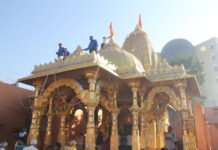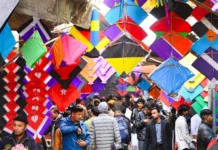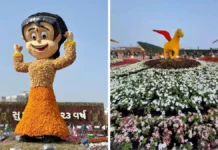
SAN DIEGO: Legendary sitar maestro and composer Pandit Ravi Shankar, who popularized Indian classical music in the West and had a major influence on icons like The Beatles’ George Harrison and Yehudi Menuhin, died here today at the age of 92.
Shankar, whose health had been fragile for the past several years, underwent heart-valve replacement surgery last Thursday at the Scripps Memorial Hospital in La Jolla, California where he breathed his last.
The music icon was admitted to the hospital last week when he complained of breathlessness.
“It is with heavy hearts we write to inform you that Pandit Ravi Shankar, husband, father, and musical soul, passed away today,” his wife and daughter, Sukanya and Anoushka Shankar, said in a joint statement.
In a separate statement, the Ravi Shankar Foundation and East Meets West Music said, “Shankar had suffered from upper- respiratory and heart issues over the past year and underwent heart-valve replacement surgery last Thursday. Though the surgery was successful, recovery proved too difficult for the 92-year-old musician.”
A recipient of Bharat Ratna in 1999, Shankar maintained residences in both India and the United States.
He is survived by his wife Sukanya; daughter Norah Jones; daughter Anoushka Shankar Wright and husband Joe Wright; three grandchildren, and four great-grandchildren.
“As you all know, his health has been fragile for the past several years and on Thursday he underwent a surgery that could have potentially given him a new lease of life.
“Unfortunately, despite the best efforts of the surgeons and doctors taking care of him, his body was not able to withstand the strain of the surgery. We were at his side when he passed away,” the family said.
A three-time Grammy award winner, Shankar last performed in California on November 4 along with Anoushka. The first of the Grammy awards came in 1967 for his collaborative album with Menuhin, ‘West Meets East’.
Shankar has also been nominated for the 2013 Grammys for his album “The Living Room Sessions Part-1”. Anoushka has also been nominated in the same category. . In recent months, performing, and especially touring, became increasingly difficult for the musician.
A Bengali Brahmin, Shankar was born Robindra Shankar on April 7, 1920 in Varanasi, the youngest of four brothers, and spent his first 10 years in relative poverty, brought up by his mother.
He was almost eight before he met his absent father, a globe-trotting lawyer, philosopher, writer and former minister to the Maharajah of Jhalawar.
In 1930, his eldest brother Uday Shankar uprooted the family to Paris, and over the next eight years Shankar enjoyed the limelight in Uday’s troupe, which toured the world introducing Europeans and Americans to Indian classical and folk dance.
Darling of the hippie movement in the 1960s, he trained for seven years under Ustad Allauddin Khan and was known for his characteristic sitar sound with powerful bass notes and a serene and spiritual touch in the alap movement of a raga.
As a performer, composer and teacher, Shankar was an Indian classical artist of the highest rank, and he spearheaded the worldwide spread of Indian music and culture, said writer and editor Oliver Craske, who provided additional narrative for Shankar’s autobiography ‘Raga Mala’.
Shankar achieved his greatest fame in the 1960s when he was embraced by the Western counterculture.
Through his influence on his great friend Harrison, and appearances at the Monterey and Woodstock festivals and the Concert for Bangladesh, he became a household name in the West, the first Indian musician to do so.
Shankar authored violin-sitar compositions for Menuhin and himself, music for flute virtuoso Jean Pierre Rampal, music for Hosan Yamamoto, master of the Shakuhachi and Musumi Miyashita – Koto virtuoso, and has collaborated with Phillip Glass (Passages).
Harrison produced and participated in two record albums, “Shankar Family & Friends” and “Festival of India” both composed by Shankar.
Shankar also composed for ballets and films in India, Canada, Europe and the United States. The latter of which includes the films “Charly,” “Gandhi,” and the “Apu Trilogy”.
A Magsaysay award winner, Shankar was nominated as a member of the Rajya Sabha in 1986. Believing in the greatness of Indian classical music and blessed with charisma and intelligence, Shankar pursued a dream of taking the music out to the Western world.
Between the early 1950s and the mid-1960s he became the leading international emissary for Indian music, first performing as a solo artist in the USSR in 1954, in Europe and North America in 1956, and Japan in 1958.
He developed a characteristic sitar sound, with powerful bass notes and a serene and spiritual touch in the alap movement of a raga.
The sitar virtuoso was responsible for incorporating many aspects of Carnatic (south Indian) music into the north Indian system, especially its mathematical approach to rhythm. He also gave a new prominence to the tabla player in concert.
He was appointed Director of Music at the Indian People’s Theatre Association, and later held the same position at All India Radio (194956). He composed his first new raga in 1945 (30 more would follow) and began a prolific recording career.
The music doyen wrote a new melody for Mohammed Iqbal’s patriotic poem ‘Sare Jahan Se Accha’.
Besides Bharat Ratna, he was also awarded the two other top Indian national civil honors – Padma Bhushan in 1967, Padma Vibhushan in 1981.
Shankar won the Silver Bear Extraordinary Prize of the Jury at the 1957 Berlin International Film Festival for composing the music for the movie Kabuliwala.
He was awarded the Sangeet Natak Akademi Award for 1962 and was named a Fellow of the academy for 1975.
In 2001, Shankar was made an Honorary Knight Commander of the Order of the British Empire by Elizabeth II for his “services to music”.
Shankar married his teacher Ustad Allauddin Khan’s daughter Annapurna Devi in 1941 and had a son, Shubhendra Shankar. He separated from Devi in 1940s.
An affair with Sue Jones, a New York concert producer, led to the birth of Norah Jones in 1979. Jones became a successful musician, winning eight Grammy Awards in 2003.
His second daughter Anoushka was born in 1981 with Sukanya Rajan, whom Shankar had known since the 1970s. He married Sukanya in 1989.
-PTI






